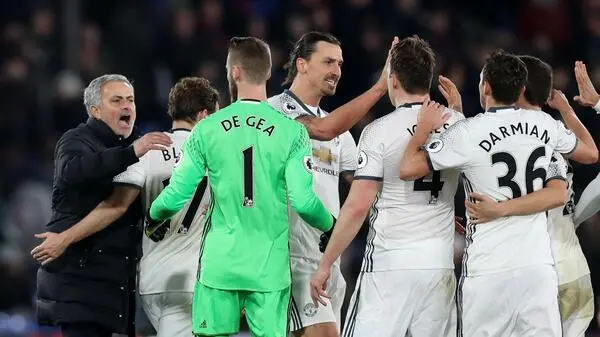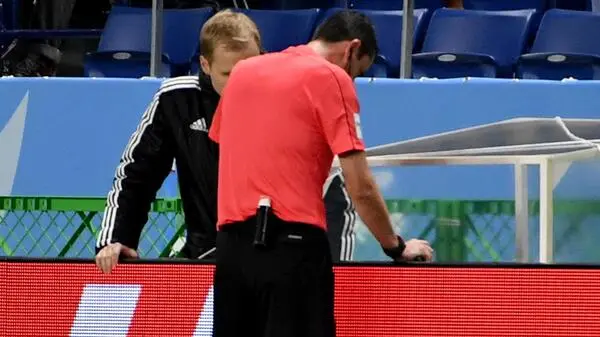On one side of the world we had the rather clumsy sight of a referee stood holding his hand up for around 30 seconds, running to the touchline, and coming back some time later to award a penalty for an incident he had missed some time earlier. Nine hours later in the Premier League we saw what many would argue was a far more compelling advert for the use of video refereeing in football as Craig Pawson made a number of controversial decisions in Manchester United’s win at Crystal Palace.
Hungarian ref Viktor Kassai was the man making history on Wednesday in Japan as he eventually gave a penalty to Kashima Antlers in their 3-0 Club World Cup semi-final win over Atletico Nacional in Suita. The official was thrown right in the deep end, being asked to review an incident which saw Kashima’s Daigo Nishi fouled in the area having come from a passive offside position.
Even disregarding the fact that the referee still managed to draw the ire of the Nacional players by ignoring the offside element and awarding the spot-kick, the whole episode left players hanging around for a noticeable pause in the game and led to significant confusion for everyone in the stadium.
Over in south London later the same day, Pawson came under attack from several figures of the game for his questionable performance at Selhurst Park as United racked up consecutive league wins for the first time since August. Whether it was Marcos Rojo’s two-footed lunge at Wilfried Zaha, Paul Pogba’s offside goal from Zlatan Ibrahimovic’s handled assist, Joe Ledley’s raised arm to intercept a left-wing cross headed for Rojo, or Juan Mata coming from a seemingly onside position to tap up from Rojo’s nod-down, there was plenty of ammunition for the pro-technology camp to ponder.

Palace fans booed the referee from the field of play at half-time, while the reaction of many United supporters after the game was to question Pawson’s decision-making in the second half, and it was a typical football reaction to do so. It all really comes down to whether you believe that is a bad thing.
Is it regrettable that the referee made a number of questionable decisions? Of course it is, but let us also commend him and his fourth official for chalking off Mata’s effort for the correct, if very marginal, interpretation of the Spaniard’s positioning as he stood fractionally offside from Rojo’s header.
But also look at the wider context of the two eye-catching refereeing performances on Wednesday. In Japan, Kassai’s having to halt play, leave the field and then return to give his decision took time a significant chunk of time out of the game in what is meant to be a spectator sport. Since it was judged by the video assistant referee Danny Makkelie to be a ‘potentially match-changing’ situation, it was denied that play could be stopped to take a second look.

Yet at Selhurst Park the last thing an initially stop-start fixture could have done with was another frustrating delay while the crowd sat around to watch the referee run back and forth before deciding whether he was right the first time or not. What if a video official had asked Pawson to look at Rojo’s challenge again and the main man decided he was right in the first place? Or if he stood by his initial reaction that neither Ibrahimovic’s nor Ledley’s arms had been in an unnatural position?
The second half was a compelling, dramatic advert for the spectacle that is Premier League football at its fast-paced best. Had it been stopped for two or three significant delays, the life could easily have been sucked out of the contest just as it was getting going.
It is undoubtedly important that the correct decision is made wherever possible, but FIFA needs to ensure it is doing everything within its video trials to cut down on the possibility of dead time when the match-going supporter is left confused and frustrated by a lack of entertainment. As much as the game has become a TV spectacle for the masses in recent years, it is the fans that travel far and wide to follow their teams who could well pay dearly if the use of video in its current guise were to spread to major, everyday competition now.
Many supporters already choose to cut and run long before full-time due to the need to get away from venues and get on with their everyday lives, so imagine what the Emirates Stadium or Old Trafford faithfuls would make of being asked to sit around for indefinite pauses while the referee becomes the centre of the show, all the while elongating a match many will not see the closing stages of anyway.
Are the stop-start events in Japan on Wednesday really preferable to the pulsating, free-flowing, end-to-end goings-on at Crystal Palace? Arguably not. Football in the Premier League currently remains untouched by the video element that's set to take an increasingly prominent role in the sport, and it might not necessarily change the game for better when it inevitably arrives.
You don’t know what you’ve got ‘til it’s gone, and sitting amongst the crowd at Selhurst as the dramatic spectacle unfolded in front of me the last place I wanted to be was at home watching replays and hollering for the referee to check the video.
For better or worse, referees at the top level - just like the world-class players they share a field with - make mistakes. And for now that remains a favoured footballing fact to sitting around in the cold waiting for referees to finish watching the telly.
> ..... - Goal